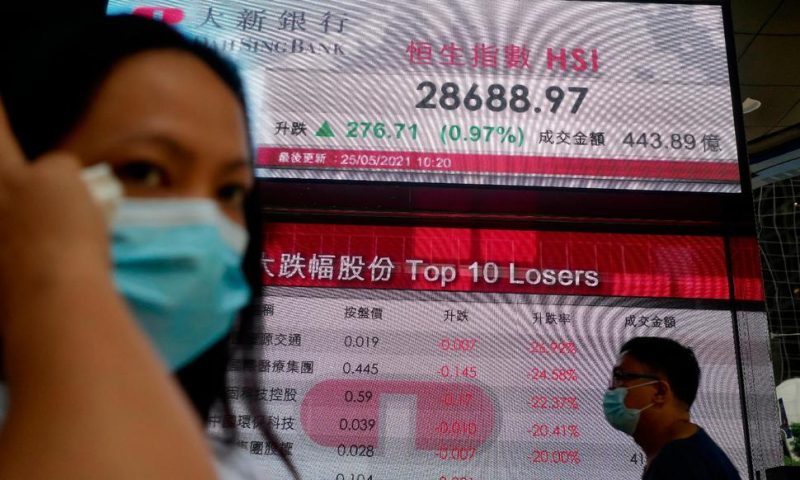Global stocks and Wall Street futures have risen as inflation fears eased and investors regained an appetite for risk.
BEIJING — Global stocks and Wall Street futures rose Tuesday as inflation fears eased and investors regained an appetite for risk.
London and Frankfurt rose in early trading. Shanghai, Tokyo and Hong Kong closed higher.
Investors worry a global economic recovery might be hampered if rising inflation prompts governments and central banks to withdraw stimulus. But a Federal Reserve official helped to allay some of those fears when he said the U.S. central bank shouldn’t look at changing policy in the midst of the coronavirus pandemic.
“The buy-everything trade is in full swing in Asia today after Wall Street decided overnight that inflation wasn’t a concern,” said Jeffrey Halley of Oanda in a report.
The FTSE 100 in London rose less than 0.% to 7,053.42 and Frankfurt’s DAX gained 0.8% to 15,556.60. The CAC in Paris was up less than 0.1% at 6,410.86.
On Wall Street, futures for the benchmark S&P 500 and for the Dow Jones Industrial Average were up 0.3%.
On Monday, the S&P rose 1%, recovering about half of last week’s losses. Gains were led by tech stocks.
The Dow added 0.5% while the tech-heavy Nasdaq Composite gained 1.4%.
In Asia, the Shanghai Composite Index surged 2.4% to 3,581.34 and the Nikkei 225 in Tokyo gained 0.7% to 28,553.98. The Hang Seng in Hong Kong advanced 1.8% to 28,910.86.
The Kospi in Seoul was 0.9% higher at 3,171.32 and the S&P-ASX 200 in Sydney added 1% to 7,115.20.
India’s Sensex was off less than 0.1% at 50,615.37. New Zealand declined while Southeast Asian markets advanced.
U.S. stocks hit a record high May 7 and then fell amid growing concern higher inflation as economies revive would disrupt commerce or prompt governments to roll back stimulus spending and easy credit.
On Monday, the president of the St. Louis Federal Reserve Bank, James Bullard, told Yahoo Finance inflation was “not really a surprise” and it wasn’t time to rethink monetary policy.
Fed officials said earlier the U.S. economy would be allowed to “run hot,” with inflation above the central bank’s 2% target, to ensure a recovery is established.
“I think there will come a time when we can talk more about changing the parameters of monetary policy,” Bullard said. “I don’t think we should do it when we’re still in the pandemic.”
The S&P 500 is on track for a 0.4% monthly gain as the latest quarterly profit-reporting season nears an end.
Tech stocks and companies that rely on direct consumer spending made gains, while sectors that are viewed as safe havens such as utilities lagged.
Nvidia rose 4.1%, while Micron Technology added 2.7%. Among communication stocks, Facebook gained 2.7% and Twitter jumped 4.8%.
Bond yields, or the difference between the market price and the payout at maturity, fell as prices rose. That often is taken as a sign investors are less concerned about inflation, which can erode the value of that payout.
On Friday, the Commerce Department releases one of its inflation gauges, the personal consumption and expenditures index, or Core PCE. The Fed prefers that tool to measure inflation, instead of the consumer price index released earlier in the month.
Economists surveyed by FactSet expect Core PCE to be up 3% from a year ago, which would be above the Fed target.
In energy markets, benchmark U.S. crude lost 34 cents to $65.71 per barrel in electronic trading on the New York Mercantile Exchange. The contract rose $2.47 to $66.05 on Monday. Brent crude, the price basis for international oils, sank 30 cents to $68.07 per barrel in London. It added $2.02 the previous session to $68.46.
The dollar declined to 108.74 yen from Monday’s 108.79 yen. The euro rose to $1.2260 from $1.2213.

